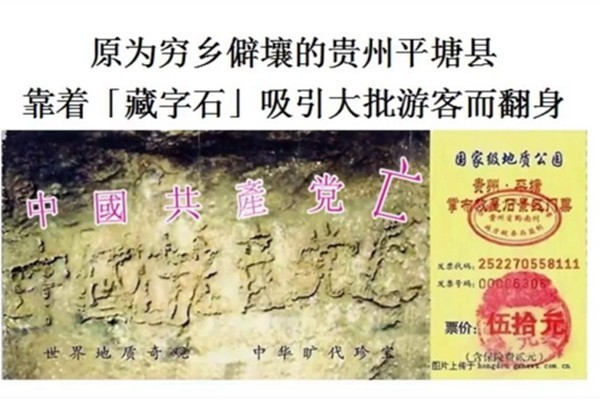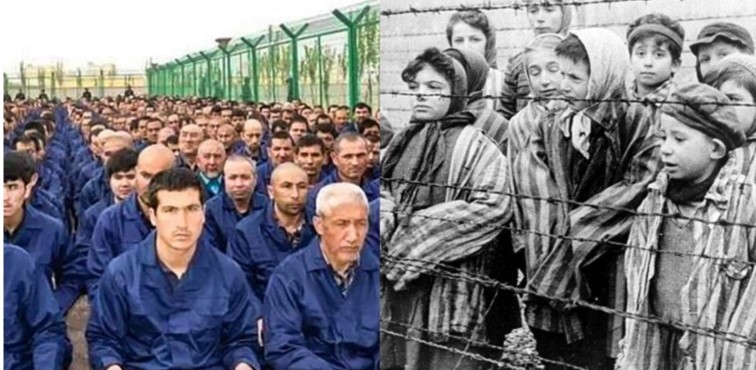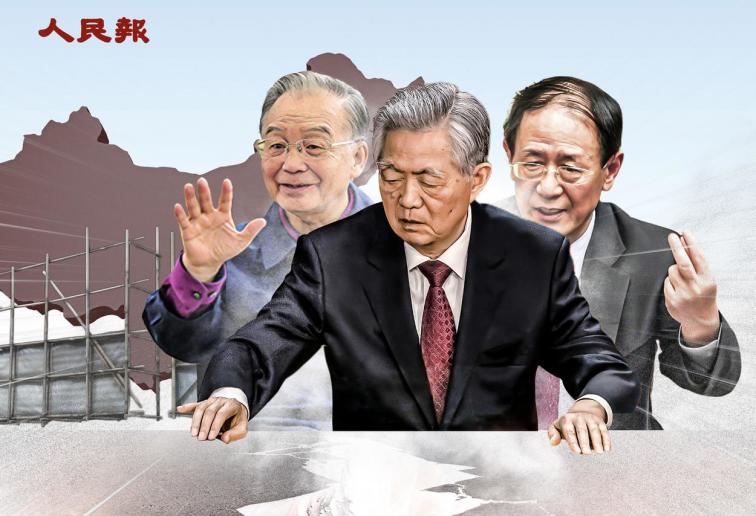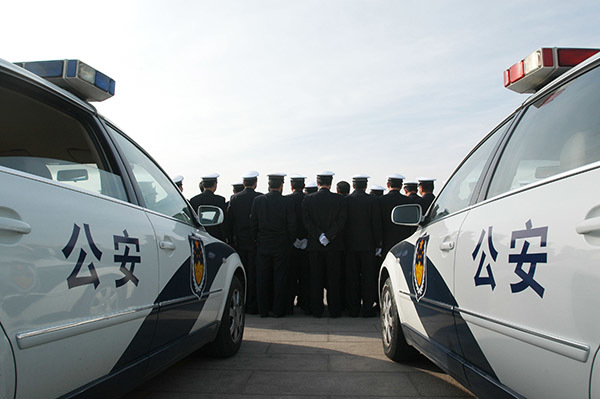A cross-section of a stone reveals the six large characters: The Chinese Communist Party is doomed. (Video screenshot)
[People News] Recently, two incidents in mainland China have triggered widespread public attention and debate. One concerns the "window-smashing" event on train K1373, and the other involves 92-year-old actor You Benchang, famed for portraying the monk Ji Gong, joining the Chinese Communist Party (CCP). The former was an act of self-rescue under emergency conditions, while the latter was a voluntary submission to the system — a willing step into the Party’s "urn."
Though the two events seem unrelated, they reflect the chaotic diversity of Chinese society and two irreconcilable value systems. They also reveal the CCP's systemic, high-pressure control over ordinary citizens, as well as its soft-power tactics of co-opting elites from religious and artistic circles. In its twilight years, the Party continues to rely on precise and severe social control as a strategy for political survival.
In the train window-smashing incident, the authorities once again manipulated the language of public policy and safety to blur the line between authoritarianism and human rights. Through this, they subtly imposed a politically correct narrative, attempting to reframe institutional abuse as a form of public protection — aiming to “manage” the public crisis through propaganda and control.
The CCP is adept at eliminating destabilizing factors before they fully emerge and burying instability — often caused by its own high-pressure stability maintenance system — within grand mainstream narratives.
Official rhetoric typically appears lofty and righteous, with headlines like: "Train Safety Cannot Allow 'Willful Window-Smashing': Rules and Reason Are the Real 'Safety Hammer'" and "'Smashing Windows Is Not Heroic, Order Ensures Safety'" "' Breaking a Window Isn’t Heroic Self-Rescue, Losing Control Emotionally Has Its Limits'"
Yet such talking points, used to maintain the regime’s “stability,” crumble under even the lightest touch of common sense. The train car temperature exceeded 38°C (100°F), with multiple elderly passengers fainting from heatstroke, and staff drenched in sweat. Is smashing a window to breathe really “emotional instability” or “provoking trouble”? Would “waiting to die” quietly be considered lawful cooperation?
Hu Xijin, former editor of Global Times, said: “Old Hu believes that the vast majority of Chinese people, in most situations, would never think of smashing train windows. I’ve never heard of passengers breaking windows to breathe. Chinese people generally follow the rules.”
By Hu's logic, were the officials who fled first during the Karamay fire in Xinjiang in 1994 “rule followers”? No high-ranking officials were on train K1373. If there had been, Hu would likely be singing a very different tune.
The real issue is: if the young man’s window-smashing were praised as an act of righteousness and bravery, it would crack the Party-state’s defensive narrative. The CCP has already repackaged its violation of basic freedoms and human rights as “the will of the state and system superiority.” Otherwise, figures like Li Wenliang and Ai Fen would be national heroes, Peng Lifa and the youth of the "White Paper Movement" would be honoured as model citizens, and Luo Shuaiyu of Xiangya Hospital would be awarded the national bravery medal — his parents celebrated as proud citizens. Instead, they remain in hiding, desperately struggling to defend their rights.
Alarmed by the symbolic linkage between broken train windows and cracks in its own authority, the CCP swiftly stepped in to regain control — pushing guided narratives, suppressing dissent, and correcting the "values deviation." But it miscalculated. This time, even the most docile "bulls and horses of the prosperous era" were no longer easy to manipulate. Netizens collectively pushed back, mockery flooded the internet, and state media was forced to retreat, eventually pivoting to “empathizing with the window-smasher” and shifting blame toward the railway department’s technical failures.
The young man in black who held the emergency hammer became an unlikely educator of the masses — his act enlightened people to the value of resistance. Afterwards, he was subjected to official “criticism and education” but returned home safely.
If the train window-smashing incident was a silent, collective rebellion against authoritarian rule and a defence of human rights, then the image of 92-year-old You Benchang joining the Party on July 1st is the opposite: black comedy and a cautionary tale — an elderly figure voluntarily walking into the Party’s trap.
The CCP must be truly scraping the barrel — recruiting a 92-year-old who likely won’t be around long enough to pay more than a few months of party dues. What image can he really uphold for the Party? The CCP claims to have over 100 million members — but how many of them are genuinely loyal? The CCDI reports that since the 18th Party Congress, millions of officials have been disciplined in the Party’s so-called "self-revolution." Add in those who escaped scrutiny and those who will eventually be caught, and you’re likely talking about tens of millions of corrupt members. With 40 million people publicly quitting the Party and mass disillusionment internally, Party-building has become a numbers game — digital loyalty over genuine faith.
They love to talk about the “Four Confidences,” but if the Party were truly confident, it would allow freedom of association and see how many fools would still join. Instead, it clings to slogans like “Uphold the Party’s leadership” and claims “history and the people chose the CCP” — when in reality, it is the CCP that has distorted history and abused the people. If the Chinese had a one-person-one-vote system, sweeping the CCP into the dustbin of history would be a mercy to the trash.
You Benchang, having been ordained as a monk twice and supposedly a person of the Buddhist path, should have remained detached and pure. Instead, he voluntarily joined the Party, bringing shame upon himself. But it’s not that surprising. In the current “Dharma-ending age,” temples are filled with frauds and monasteries with charlatans. The red flag has long flown over places of worship; monks sing the national anthem, recite Marxism, drive BMWs, keep mistresses, and rake in money. That some Buddhist lay practitioners would join the Party is unsurprising — but to what end? Can they really bring good fortune or longevity to the CCP?
It’s said that Xi Jinping believes in Buddhism and often prays to deities. What the ruler likes, his subordinates pursue even more aggressively. United Front authorities pulling You Benchang into the Party may just be a way of currying favour with Xi — Party-building by flattery. A double win: religious co-optation and artistic propaganda.
But what does You Benchang gain? Has he truly become senile and morally blind? Some netizens speculate that these elite artists who prop up the regime lack for nothing — except spare organs. Rumours abound that former culture minister Gao Zhanxiang used the organs of Hu Xinyu. The Party wants face, the artists want life — a perfect match.
But man proposes heaven disposes. You Benchang’s portrayal of Ji Gong may still have some fans among those born in the 1970s, but few post-80s or 90s care about old TV dramas, let alone the internet-native generation. The times have changed. With the economy faltering, those born in the ’70s are slipping out of the middle class or fleeing the country. The ’80s and ’90s are crushed by mortgages. The 2000s generation has opted to “lie flat” and live off their parents. Everyone is cursing the CCP. The public is waking up. By glorifying an old actor joining the Party, the CCP is putting on a show — but who’s still buying it? Apart from the actor himself, who’s really “in character”? Most are just quietly waiting for the Party’s final curtain. △
(Originally published by People News)










News magazine bootstrap themes!
I like this themes, fast loading and look profesional
Thank you Carlos!
You're welcome!
Please support me with give positive rating!
Yes Sure!